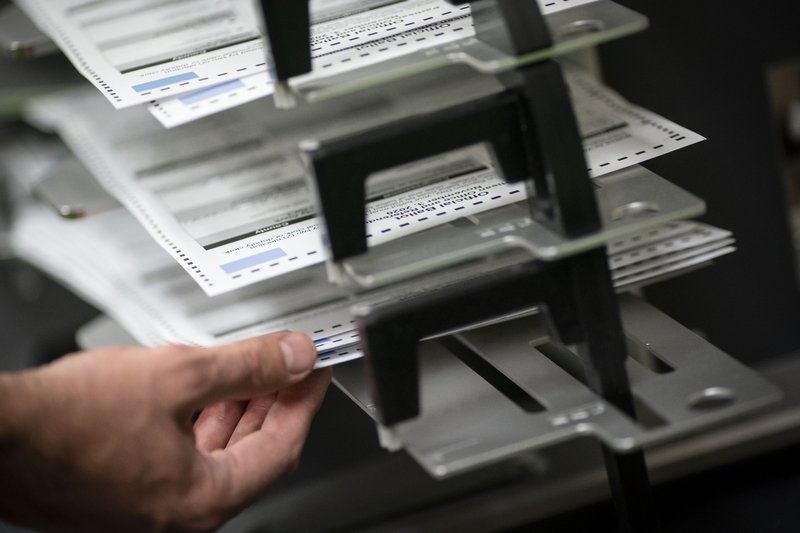Politics
Wisconsin election clerks race to understand ballot ruling

MADISON, Wis. (AP) — Wisconsin’s 1,800-plus election clerks were racing Thursday to understand a judge’s ruling nine weeks before the election that some fear could lead to absentee ballots being counted in parts of the battleground state but rejected in others.
A judge on Wednesday barred the bipartisan Wisconsin Elections Commission from issuing guidance to clerks, in place since 2016, about how to handle absentee ballots that are missing all or parts of the address of the person who witnessed the voter casting the ballot. Clerks say that now means it is up to them to determine which ballots should be counted and which should not.
“What is tricky is what is an address?” said Dane County Clerk Scott McDonell. “You’re going to get varying interpretations.”
State law requires clerks to either return ballots missing a witness address to the voter to be corrected or not count the ballot. The elections commission in 2016 told clerks that they could add information themselves if all or part of an address was missing.
Clerks only address problems on the witness certificate, which doubles as an envelope, and not the ballot itself. Republicans did not contest the practice until after Donald Trump’s narrow loss in 2020, when nearly 1.4 million voters cast absentee ballots and COVID-19 vaccines weren’t available yet.
Waukesha County Circuit Judge Michael Aprahamian on Wednesday said state law does not allow clerks to fill in missing information. He granted a request from Republicans, including the GOP-controlled Legislature, to prohibit the elections commission from telling clerks they can do that. Aprahamian was appointed by former Republican Gov. Scott Walker.
Democrats plan to appeal and the case is expected to end up before the conservative-controlled Wisconsin Supreme Court.
In the meantime, clerks are struggling to understand what ballots they should count, or not, with absentee voting slated to begin in about two weeks. The deadline for absentee ballots to be mailed to voters is Sept. 22.
The elections commission has guidance on what constitutes an address, but the issue has not been addressed by the courts.
“It certainly leaves things very unclear,” said Claire Woodall-Vogg, executive director of the Milwaukee Election Commission, in an email. “Historically, voters have not been penalized for minor errors in voting where intent is clear. I will be consulting with my City Attorney’s office for their advice on the matter.”
The number of affected ballots is likely to be small but could be an issue in close races. President Joe Biden won Wisconsin in 2020 by fewer than 21,000 votes.
Woodall-Vogg said just over 1% of all absentee ballots cast in Milwaukee in April were missing address information. In a recount of the Republican race for the 2nd Congressional District, which includes the city of Madison, only 25 ballots out of 120,000 cast had deficient absentee addresses, McDonell said.
The Legislative Audit Bureau last year reviewed nearly 15,000 absentee ballot envelopes from the 2020 election across 29 municipalities and found that 1,022, or about 7%, were missing parts of witness addresses. Only 15 ballots, or 0.1%, had no witness address. Auditors found that clerks had corrected addresses on 66 envelopes, or 0.4% of the sample.
McDonell said in Dane County, the state’s second largest, the practice has been to count ballots that contain partial addresses.
“We don’t care if it says Wisconsin or has the zip,” he said. “So it’s a game of what’s missing. … The sort of basic common sense is ‘Can I find this address?’”
Republicans contend the ruling means that clerks have two choices for ballots missing information: return them to voters or don’t count them.
“This ruling cleans up the process, and if (the elections commission) puts aside political games by issuing sound guidance, this will ensure uniformity across all of the state’s municipalities,” said Wisconsin Republican Party Chairman Paul Farrow.
The attorney for the Republican Party of Waukesha County, which brought the lawsuit, did not immediately return a message seeking comment Thursday. Republican legislative leaders, who joined the lawsuit, did not immediately return messages.
Both McDonell and Woodall-Vogg said they would be trying to educate voters about the need to have witnesses completely fill out the address portion on the absentee ballot. The ruling will increase the workload on clerks who will be returning ballots to voters to complete missing information, McDonell said.
“We will continue to be diligent in our communication with voters – both initially when mailing the ballot and if needing to return the ballot to be cured,” Woodall-Vogg said. “I fear for voters across the state who live in municipalities where the clerk may not have the staff or resources to notify a voter of their error.”

